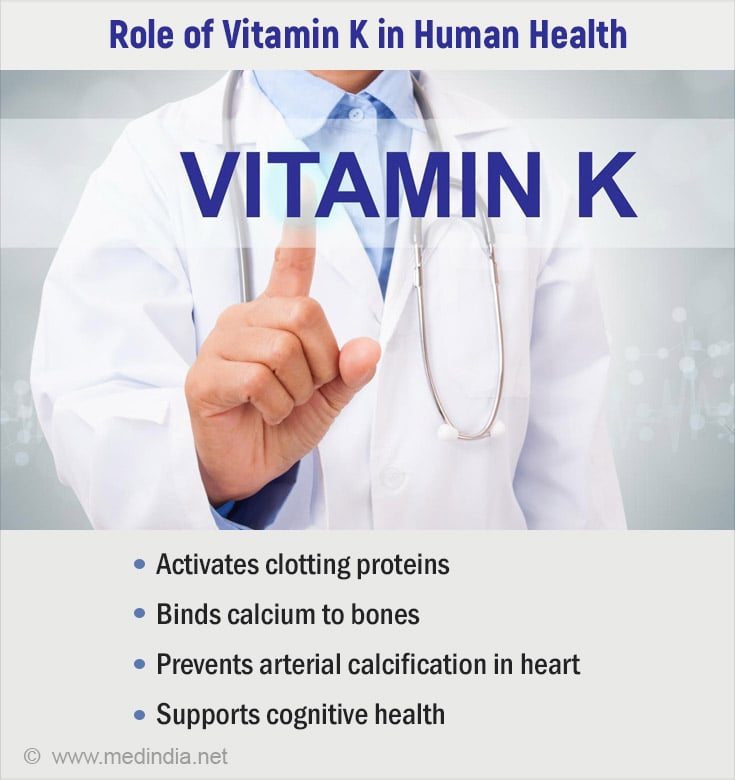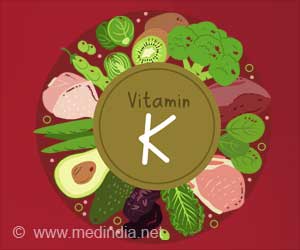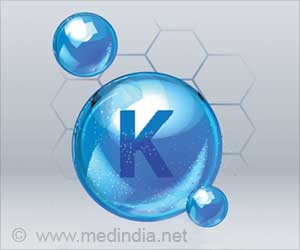- Vitamin K Fact Sheet for Health Professionals - (https://ods.od.nih.gov/factsheets/VitaminK-HealthProfessional/)
- Try These 21 Healthy Foods Full of Vitamin K - (https://health.clevelandclinic.org/foods-high-in-vitamin-k)
About
Vitamin K is an essential nutrient that plays a pivotal role in the body’s ability to function properly. Despite its importance, it’s often overlooked, which can lead to severe health consequences and, in extreme cases, even death. Understanding the role of Vitamin K, its importance in various bodily processes, and the best sources of this vitamin can help prevent these potentially life-threatening issues(1✔ ✔Trusted Source
Vitamin K Fact Sheet for Health Professionals
Go to source).
Did You Know?
Severe Vitamin K deficiency can lead to uncontrollable bleeding and fatal complications! #nutrition #medindia
What is Vitamin K?
Vitamin K is a fat-soluble vitamin that is critical for a range of bodily functions. There are two main forms of Vitamin K(2✔ ✔Trusted Source
Try These 21 Healthy Foods Full of Vitamin K
Go to source):
- Vitamin K1 (Phylloquinone): Primarily found in plant-based foods, especially green leafy vegetables.
- Vitamin K2 (Menaquinone): Found in animal-based products and fermented foods. It also has a variety of subtypes that are absorbed and utilized differently in the body.
While Vitamin K1 is mainly associated with blood clotting, Vitamin K2 plays a key role in bone and heart health.
Top 11 Foods Rich in Vitamin K
Ensuring a diet rich in Vitamin K is important for maintaining optimal health. Here are 11 foods that are excellent sources of this essential nutrient.
1. Kale
Kale is one of the most nutrient-dense foods available and is a powerhouse of Vitamin K. Just 1 cup of cooked kale provides an astounding 531 micrograms (mcg) of Vitamin K. Incorporating kale into salads, soups, or smoothies can significantly boost your Vitamin K intake.
2. Spinach
Spinach is another leafy green loaded with Vitamin K, offering around 483 mcg per 1 cup cooked. Spinach is versatile and can be eaten raw in salads or sautéed as a side dish. Its mild taste makes it easy to incorporate into various meals.
3. Broccoli
Broccoli provides approximately 220 mcg of Vitamin K per 1 cup cooked. This cruciferous vegetable is packed with other nutrients as well, making it a great addition to a healthy diet. Steam, roast, or stir-fry broccoli to maximize its nutrient content.
4. Brussels Sprouts
Brussels sprouts contain about 156 mcg of Vitamin K per 1 cup cooked. These small cruciferous vegetables are also rich in fiber and other essential vitamins, making them a great food for heart and gut health.
5. Collard Greens
Collard greens are one of the richest sources of Vitamin K, providing around 772 mcg per 1 cup cooked. This vegetable is a staple in Southern cuisine and can be steamed, boiled, or sautéed for a hearty, nutritious meal.
6. Natto (Fermented Soybeans)
Natto is a traditional Japanese food made from fermented soybeans, and it is an exceptional source of Vitamin K2. A single serving contains around 850 mcg of Vitamin K, specifically the K2 form, which supports both bone and cardiovascular health.
7. Parsley
A less obvious but potent source of Vitamin K is parsley. Just 100 grams of parsley contain a whopping 1640 mcg of Vitamin K. Though usually used as a garnish, parsley can be used generously in salads, soups, and sauces to increase your Vitamin K intake.
8. Cabbage
Cabbage provides about 82 mcg of Vitamin K per 1 cup cooked. It’s a low-cost, widely available vegetable that can be added to many dishes, from stir-fries to soups. Both raw and cooked cabbage are excellent sources of Vitamin K.
9. Prunes
Prunes offer around 60 mcg of Vitamin K per half-cup serving. These dried fruits are also rich in antioxidants and fiber, making them beneficial for digestion and bone density, in addition to their Vitamin K content.
10. Asparagus
Asparagus is a good source of Vitamin K, providing 72 mcg per 1 cup cooked. It’s also rich in folate and antioxidants, which contribute to its overall health benefits. Roast, grill, or steam asparagus for a tasty and nutritious side dish.
11. Avocado
Avocado offers around 21 mcg of Vitamin K per half of the fruit. While its Vitamin K content is not as high as that of leafy greens, avocados are packed with healthy fats that enhance the absorption of fat-soluble vitamins like Vitamin K.
Why Vitamin K Deficiency Can Be Fatal
The importance of Vitamin K becomes strikingly clear when considering the health risks associated with its deficiency.
1. Uncontrolled Bleeding
One of the most immediate and severe risks of Vitamin K deficiency is hemorrhage, or uncontrolled bleeding. Since Vitamin K is essential for blood clotting, even a small deficiency can lead to severe blood loss. In newborns and individuals on blood thinners, a lack of Vitamin K can lead to internal bleeding, which can be fatal.
2. Osteoporosis and Bone Fractures
Vitamin K is necessary for bone health. Without enough of it, bones cannot efficiently bind calcium, leading to a higher risk of fractures. Long-term Vitamin K deficiency can result in osteoporosis, a condition where bones become weak and brittle.

3. Heart Disease
Vitamin K2 plays a critical role in regulating calcium deposition in the arteries. A deficiency in Vitamin K2 can cause calcium to build up in blood vessels, increasing the risk of heart attacks and strokes. Over time, this can lead to a condition known as vascular calcification, which is difficult to reverse and often life-threatening.
4. Cognitive Decline
While more research is needed, there is growing evidence to suggest that Vitamin K deficiency may contribute to cognitive decline in older adults. The lack of Vitamin K-dependent proteins in the brain could potentially result in an increased risk of neurodegenerative diseases like Alzheimer's.
Vitamin K is a vital nutrient that supports essential functions in the human body, such as blood clotting, bone strength, and cardiovascular health. The absence of this vitamin can lead to severe consequences, including uncontrolled bleeding, weakened bones, heart disease, and even death.
To avoid these serious health risks, it’s crucial to maintain a diet rich in Vitamin K by consuming foods like leafy greens, cruciferous vegetables, and fermented products. By incorporating these Vitamin K-rich foods into your diet, you can protect your body from the potentially life-threatening effects of a deficiency.









